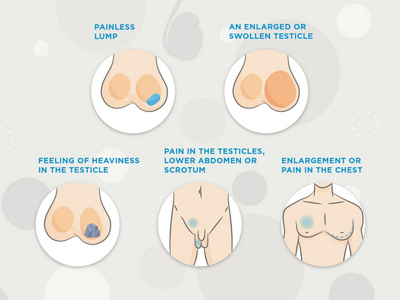Testicular cancer primarily affects young men between the ages of 20 and 40. The cancer usually only occurs on one side, in one of the two testicles. The recovery rates for testicular cancer are often very high, even at a later stage when metastases have already formed. Around 440 men are diagnosed with testicular cancer in Switzerland every year, of whom 85 % are under 50 years old at the time of diagnosis.
- Types of testicular cancer
- Causes and risk factors
- Symptoms
- Diagnosis
- Early detection through palpation
- Treatment
Types of testicular cancer
Different types of cancer can develop in the testicles, depending on the cells from which the tumour originates. It is important to differentiate between seminomas (tumours of the germ cells) and non-seminomas. Non-seminoma is the collective term for all types of testicular cancer which do not originate from germ cells. The difference is important because these two tumours are treated differently. Non-seminomas are not irradiated because they are less radiation-sensitive.
Causes and risk factors
The exact causes of testicular tumours are not known. The most important risk factor is undescended testicles in childhood. In this case, the testicle does not “wander” sufficiently or “wanders” too late into the scrotum and remains in the abdomen. Genetic components also seem to play a certain role in the case of testicular cancer. Testicular cancer sometimes occurs more frequently in one family.
Symptoms of testicular cancer
Testicular cancer initially causes few or almost no symptoms. Some early symptoms are swelling or enlargement of the scrotum as well as calluses or lumps in the testicles. These are usually pain-free. With time, a feeling of heaviness or a pulling in the testicles can become noticeable. If the illness is advanced, fatigue, loss of appetite, weight loss and back pain can occur.
Diagnosis
Testicular cancer is usually discovered coincidentally while palpating the testicles. Changes in the size of the testicles or calluses and lumps should be checked by a doctor. If testicular cancer is suspected, different examinations such as an ultrasound, computed tomography and a biopsy are carried out.
Early detection through palpation
A tumour affecting the testicles can be detected early on by palpating the testicles with the hand at regular intervals (once a month). This is best done standing up and under warm water, as it relaxes the skin of the scrotum and allows the testicles to be easily grasped. Should any enlargement, calluses or hard lumps be noticed in the testicles, this is a possible warning sign, and a urologist should be consulted to clarify the situation at the earliest opportunity.
It is recommended that young men between the ages of 14 and 45 routinely check their testicles.
Treatment of testicular cancer
The treatment of tumours affecting the testicles depends on the type of cancer involved and the stage of the patient's disease. To begin with, the affected testicle is usually removed surgically. As only one testicle is usually impacted by a tumour, this has no effect on sexual function or fertility in men.
No further treatment is necessary in most cases if the cancer is still at an early stage, i.e., is not affecting the lymph nodes or causing metastases. Regular check-ups are required to monitor the success of the treatment for the patient.
If the tumour has reached an advanced stage, surgery will be followed by chemotherapy and also, depending on the type of cancer, radiation therapy. Testicular cancer responds very well to these types of treatment. This means that even later stages of the disease involving metastases can be cured in most cases.
Sometimes the level of sex hormone (testosterone) produced after removing a testicle is no longer sufficient. In such cases, medical testosterone must be administered to the patient.
Why choose Hirslanden
The specialists at Hirslanden, the largest private hospital group in Switzerland, are renowned for their expertise and many years of experience in treating your illness.
You can expect comfortable rooms and a modern infrastructure as well as the highest standards in medicine and care.
We will help you throughout your entire stay, organising additional services such as translators and interpreters, transport, and overnight hotel stays for you and your relatives, and addressing all your administrative questions.
A personal contact from the Hirslanden International team will take care of your needs from the time that you first contact us to arrange an appointment through to the end of your treatment.
Contact us – we are happy to help you!


